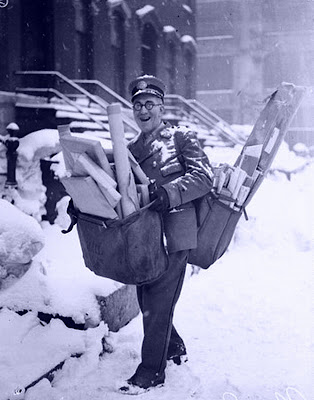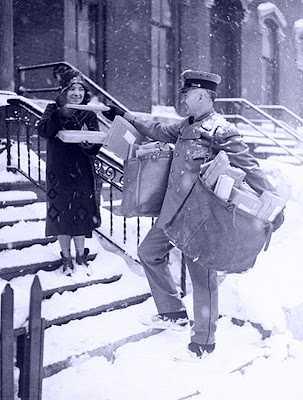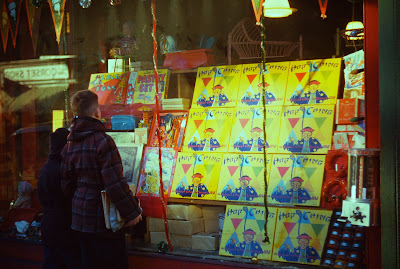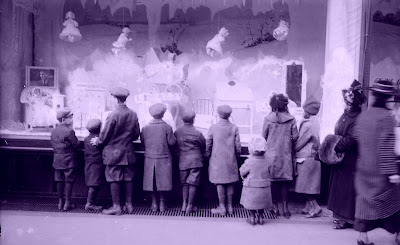 Happy Holidays! For this third annual Yuletide Frolic edition of "Vitaphone Varieties," we'll acknowledge the disconcerting notion that the less romantic and fanciful aspects of the late 20's and early 30's might be closer to us than we suspect by entirely ignoring that fact and simply having fun with this post!
Happy Holidays! For this third annual Yuletide Frolic edition of "Vitaphone Varieties," we'll acknowledge the disconcerting notion that the less romantic and fanciful aspects of the late 20's and early 30's might be closer to us than we suspect by entirely ignoring that fact and simply having fun with this post!While postmen today don't seem to carry parcels any longer --- or smile much either for that matter, one can't help but wonder at the contents of some of those neatly wrapped parcels he cheerfully lugs up this snowy residential city street --- here forever caught in a mid-delivery time warp of the sort that most of us still experience today every now and then.
To accompany him on his appointed route, let's pipe in Eddie Cantor's (timely!) 1931 recording of "Cheer Up! Smile! Nertz!"
"Cheer Up! Smile! Nertz!" (1931)

Although this second image was taken on the same stretch of street, we have another smiling postman here --- and a grateful recipient as well. To continue and cap this little introductory "Cheer Up" motif, we've coaxed the fragile Noel Francis out of the dark and distant old posts from these pages to warble "Cheer Up and Smile" from the preserved but elusive "New Movietone Follies of 1930." Miss Francis? Ah, here she is... Yes, this way... Take your time.... Deep breath now... Ready? Ladies and Gentlemen, Miss Noel Francis:
"Cheer Up and Smile!" (1930)
The sadly absent mid-1929 Universal talkie "College Love" (an eight reel elaboration upon the studio's long running and successful "Collegians" series of two-reelers) is described thusly and adequately by the AFI catalog:
"At Caldwell College, Flash Thomas (Eddie Phillips,) captain of the football team, is in love with Dorothy May (Dorothy Gulliver,) who is infatuated with Bob Wilson (George Lewis,) without whose help Thomas would not be such an outstanding player. Broken hearted, Thomas tries to laugh it off, then against the rules accepts an invitation to a roadhouse party. Wilson, discovering he is missing, hides in Thomas' bed to fool the coach (Hayden Stevinson,) then tries to persuade him to leave the party. When they return, however, the coach discovers the ruse and puts Wilson, who shields Thomas, out of the game. Dorothy asks for an explanation and, receiving none, returns Thomas' fraternity pin. At the last minute, Wilson is rushed into the game and Thomas plays to redeem himself. Wilson scores a touchdown, is proclaimed a hero, and wins the love of Dorothy."
 A Charleston, West Virginia newspaper review from late July of 1929 brings us a bit closer to a film we'll likely never otherwise experience:
A Charleston, West Virginia newspaper review from late July of 1929 brings us a bit closer to a film we'll likely never otherwise experience:"Those who have seen the cast of promising young screen players in the series of short college stories entitled 'The Collegians,' are due for a surprise in their first feature production, 'College Love,' showing at the Virginia Theater."
"It is difficult to identify the improvement, but that improvement is very obvious. Perhaps the addition of sound is responsible, but more like, one observes, it's the scenario. 'College Love' gets away from the Horatio Alger type of story and therein, one suspects, lies its success."
"There is an abundance of action in this picture - action on the gridiron, on the campus, and action in romance and comedy. The musical score greatly enhances the story - there are some very tuneful selections. The dialogue is on par with many of the motion pictures which stars with years of learning appear."
 "'College Love' is a swiftly-moving story of life in one of the large institutions of learning - although the 'learning' feature is entirely ignored. The action hinges upon a football game and the male leads are taken by members of the squad."
"'College Love' is a swiftly-moving story of life in one of the large institutions of learning - although the 'learning' feature is entirely ignored. The action hinges upon a football game and the male leads are taken by members of the squad.""Brought into the plot is the 'darling of the campus' and the rivalry between the two heroes of the gridiron for her attention. Excellent scenes of a football game before thousands of fans are shown. They are so realistic that one could easily imagine they were being shown from a news reel."
"Dorothy Gulliver takes the part of the campus favorite. The rivals are George Lewis and Eddie Phillips. Other who have taken parts in the 'Collegians' series add considerably to this picture. It is, without exaggeration, the best picture portraying college life that has been produced in sound."
While I couldn't dredge up recordings of the two original tunes featured in "College Love" ("It's You" and "Oh, How We Love Our College,") we have an entertaining 1927 recording that takes the accepted tradition of casting college pictures with performers for whom college youth is a distant and faded memory to a level of high parody. The vocal is by our old friend, Billy Murray, joined here with dialect comedian, Monroe Silver.
"Oh, How We Love Our Alma Mater" (1927)
 Before moving along to our next feature item, a selection of melodies ---
Before moving along to our next feature item, a selection of melodies ---From a long list entitled "Lost Films That We're Not So Sure We'd Go Out of Our Way to See if They Weren't," comes this pairing of beautifully performed tunes from Metro's 1930 "The Rogue Song," as interpreted by Nat Shilkret & the Victor Orchestra:
"The Rogue Song" and "When I'm Looking At You"
Resurrecting a tune from time dimmed pages of this blog --- if only for the fact that it well deserves another brief fling at fame --- is "Blue Baby," a 1928 melody that all but soars upwards and away every time I hear it --- which isn't often enough. The music is by Roy Leonard & His Orchestra (that swirling jazz violin knocks me out every time!) and the vocal is by Irving Kaufman --- who is nothing short of perfect here.
"Blue Baby" (1928)
With each passing year, Fox's 1929 landmark musical "Sunny Side Up" seems to never quite catch the DVD release train --- bravely grasping for the brass ring, but never quite making it into boxed sets where its inclusion might not be precisely logical but neither unwelcome either, as an extra or supplement. Hope still exists that Fox might gather up "Just Imagine," "New Movietone Follies of 1930," "Happy Days," "Hearts in Dixie" and "Sunny Side Up" for a diverse and important collection of the studio's early sound product --- but, alas and alack! -- none of these films can boast any pedigree (an element apparently vitally critical to Fox when pondering what to do next) other than that they were all wildly popular and successful with audiences of the day.
Here's a gem of a review of "Sunny Side Up" but Wood Soanes, from September of 1929:
 "'Sunny Side Up' isn't the best title in the world for a picture - it sounds as if the film were an epic of the hash house - but 'Sunny Side Up' is one of the best pictures of the year and another ten-strike for Janet Gaynor and Charles Farrell. It doesn't require the gifts of a prophet to foresee the box office interest that will be aroused in this new Fox release, previewed at the Grand Lake last evening, for it affords Miss Gaynor the best chance she has had since 'Seventh Heaven.' It provides us with some new screen faces if importance, it has a bevy of corking tunes, it possesses some elaborate scenic contrivances, and most of all - it has laughs."
"'Sunny Side Up' isn't the best title in the world for a picture - it sounds as if the film were an epic of the hash house - but 'Sunny Side Up' is one of the best pictures of the year and another ten-strike for Janet Gaynor and Charles Farrell. It doesn't require the gifts of a prophet to foresee the box office interest that will be aroused in this new Fox release, previewed at the Grand Lake last evening, for it affords Miss Gaynor the best chance she has had since 'Seventh Heaven.' It provides us with some new screen faces if importance, it has a bevy of corking tunes, it possesses some elaborate scenic contrivances, and most of all - it has laughs.""As a matter of record, the Grand Lake audience hasn't laughed more at six romantic comedies. And for these guffaws, you may thank the memory of the gag man who exhumed comedy situations from all ears; and the skill of El Brendel, Marjorie White and Frank Richardson - particularly Miss White, because she had to make most of her own comedy."
"It may seem a little odd to have such a profusion of diaphragm laughter in the story that is merely a revision of the Cinderella tale in which a winsome East Side girl dreams of a Prince Charming and has him come to life almost at once: a story in which Cinderella is transported into the 400, is ousted by mistake and then gets back with flying colors and her man. That tale surely, is not new to screen audiences."
"But, the telling of it was another story. David Butler unfolds his first sequences in the East Side tenement where Miss Gaynor lives and is beloved by Brendel, the delicatessen merchant. Her pals are Frank Richardson, a song plugger with a flair for musical theft that is inordinate, and Miss White who is just one of those little jazz babes with a delicious sense of humor and an aptitude for nut comedy."
"The merit of 'Sunny Side Up' as may easily be discovered from this synopsis is not in the story, nor, you may be informed, is it in the work done by Farrell who, is pretty to look at but has one of those baby voices that go with the vo-de-do boys in the male quartets. It is the ensemble effect, the blending of rich comedy with acceptable pathos, and the singing of such tunes as 'If I Had a Talking Picture of You.' "
"Sunny Side Up" ran two hours and seven minutes last evening and will, of consequence, be edited. Perhaps in the thirty minutes of material that is dropped we will lose the symphony orchestra effect when Miss Gaynor plays the zither - no fooling - in the privacy of her boudoir; some of the more obvious of the cheap jokes; a couple of the burlesque scenes into which vulgarity crept; the children's part in the 'Talking Picture' chorus and some of the painted back drops."
"Of all things that should be retained at all cost are the 'daisy specialty' of Miss White and Richrdson, and the beautiful Arctic-to-Tropic transformation scene. This last was one of the most unique presentations to be put on the screen and while it is a little too long, it is sufficiently unique to stand. One looks for effects of this kind in the 'revue' pictures, but doesn't find it. Then, it shows up in a 'Sunny Side Up.'"
Let's hope the film again "shows up" again in a form that restores at least some of its once former glory --- and rescues it from the black market where it now unhappily resides in tattered and senseless near-oblivion.
 "If I Had a Talking Picture of You"
"If I Had a Talking Picture of You"(1929) Johnny Marvin
"You've Got Me Picking Petals..."
(1929) The High Hatters
"Turn on the Heat"
(1929) The Collegiate Jazzers
Vocal by (who else?) Irving Kaufman
Medley from "Sunny Side Up"
(1929) Al Benny's Broadway Boys
Selections from "Sunny Side Up"
(1929) The Rhythm Maniacs
Side One - Side Two
 Our next item of interest is courtesy of Doug Gerbino, a loyal reader and friend of these pages:
Our next item of interest is courtesy of Doug Gerbino, a loyal reader and friend of these pages:Accompanying most initial screenings of Warner Brothers' 1927 Vitaphone success "The Better 'Ole" --- a broad comedy of the Great War that starred Syd Chaplin as "Old Bill," a character created by Bruce Bairnsfather --- was none other than Mr. Bairnsfather himself, via a Vitaphone short subject.
Providing a clever introduction to both the character of "Old Bill" and the feature film itself, this simply produced short subject presented Mr. Bairnsfather before the drawing easel, where he replicated his famous character while telling of how it came to be created. But --- to paraphrase John Miljan --- why tell you about it when I cannot let you see it, but hear it? Here then --- and again, thanks to Doug, is Bruce Bairnsfather (portrait, below left) via the Vitaphone.
 Bruce Bairnsfather (1927) Vitaphone Short Subject #393
Bruce Bairnsfather (1927) Vitaphone Short Subject #393Note: The disc has a VERY rough start but ultimately clears up --- somewhat. The other-wordly squeals and groans of this ravaged disc serve as a sad reminder of just how fragile the relics of our past are.
While Vitaphone discs are sturdy souls, and tenacious survivors as well, radio transcription discs of the late 20's and early 30's seeming had an unspoken suicide pact, given the low numbers in which they exist today. That said, it's a pleasure to offer two that were given the will to live and are with us today --- and in fine shape too!
From 1933, NBC's "The A&P Gypsies" (with tenor Frank Parker, under the direction of Harry Horlick) dish up some elegantly arranged melodies of the day -- as well as some mid-brow salon-pop compositions and foreign novelties: "It's Just a Memory," "Butterflies in the Rain," Sigmund Romberg's "Road to Paradise," "Love Songs of the Nile," "Characteristic Russian Melodies," "Let's Have Another Cup of Coffee," "Strike Me Pink," Selections from Victor Herbert's "Natoma," "Stardust," and "Dardanella."
The A&P Gypsies (NBC - 1933)
The real surprise here was just how elaborate this "canned" radio show was in terms of production and care of recording. If you can arrange for your next dinner party to run no more than 36 minutes, this is what you need playing in the background!
"Blossom Time" (1931)
"Blossom Time" (1931) was a short-lived (perhaps even one-shot) syndicated musical offering sponsored by local "Say It With Flowers" florists --- and as such, the focus was one tunes with floral themes or titles. No shortage there, I suppose --- just not tunes that people wanted to hear time and again. Heard here: "I'm Bringing A Red, Red Rose," "Where the Shy Little Violets Grow," "In My Bouquet of Memories," etc., etc. Listeners were urged to bring the whole family to their local florist, where the "Fall Flower Festival" was going on at full speed, with something for everyone! - "Come see the flowers - spend happy hours."
The text portion of this post concludes here --- but a good deal still awaits your eyes and ears ahead! We'll be back shortly after the New Year arrives --- and here's a sincere wish to each and every one of you for a Happy Holiday and a bright, healthy and prosperous 2009!!!!!!!!!

"Christmas Melodies" (1928)
Paul Whiteman & His Orchestra
"Jingle Bells" and "Silent Night" (1931)
Advertisement for the Junior Home Magazine
Phil Spitalny & His Orchestra
 "My Silver Tree" (1928)
"My Silver Tree" (1928)The Broadway Nitelites
"Jingle Bells" (1925)
The Revelers
 "Singing in the Bathtub" (1929)
"Singing in the Bathtub" (1929)From "Show of Shows"
Fred Meles' Symphonic Jazz Orchestra
"The Kinkajou" (1927)
From "Rio Rita"
Nat Shilkret & the Victor Orchestra, Vocal by Billy Murray
 Promotional Disc for
Promotional Disc for"Why Bring That Up?" (1929)
 "It Happened in Monterey" (1930)
"It Happened in Monterey" (1930)From "King of Jazz"
Henryk Gold & His Orchestra
 "A Night of Happiness"
"A Night of Happiness"from "A Song of Kentucky" (Fox-1929-Lost Film)
Jackie Taylor's Orchestra, Vocal by Buster Dees
"What is claimed to be the longest close-up ever made in
all talking motion pictures was taken of Lois Moran in
'A Song of Kentucky.' Co-starred with Miss Moran is
Joe Wagstaff with Dorothy Burgess leading the
supporting cast in a story that has as its greatest
thrill, the running of the 1929 Kentucky Derby and
the charm in its musical atmosphere."
 "Wedding of the Painted Doll" (1929)
"Wedding of the Painted Doll" (1929)The Badgers
From "The Broadway Melody"
"Chinatown, My Chinatown" (circa 1916)
Tenor Solo - Little Wonder Records
Ad for the "Hop Ching" Checker Game
on Display in Above Window


"That Old Gang of Mine" (1923)
Ernest Jones & Billy Hare
 "So What's the Use?" (1910)
"So What's the Use?" (1910)Raymond Hitchcock
 "The Perfect Song" (1930)
"The Perfect Song" (1930)Nat Shilkret & the Victor Salon Orchestra
"Maybe?" (1926)
Nat Shilkret & the Victor Orchestra, with Jesse Crawford
 ###
###